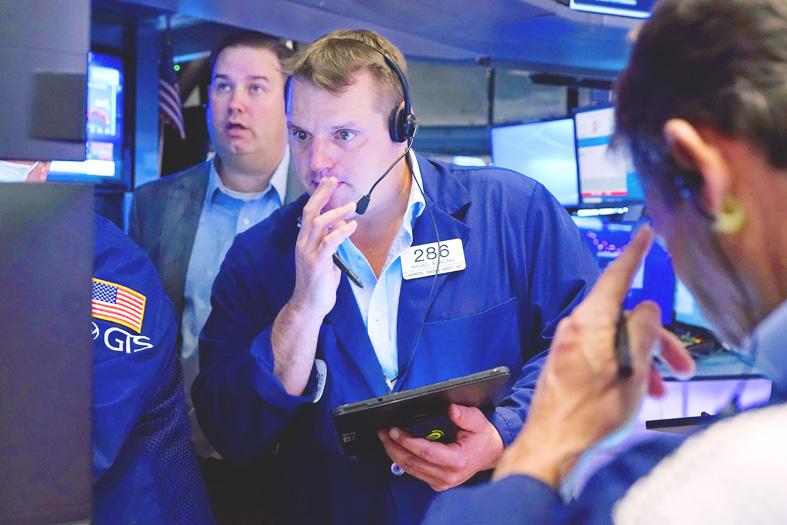A brutal selloff of Chinese stocks trading in the US has erased more than US$1 trillion in value since February and shows no signs of easing, as regulators on both sides of the globe continue to put pressure on the firms.
The NASDAQ Golden Dragon China Index — which tracks China-exposed firms listed in the US — plunged 9.1 percent on Friday, the most since 2008, after Didi Global Inc (滴滴) said it is planning to delist its shares from the New York Stock Exchange.
The Didi announcement marks a stunning reversal of fortunes after the firm raised US$4.4 billion in an initial public offering (IPO) in June, and adds even more uncertainty to the prospects for other US-listed Chinese firms. Didi shares fell 23 percent at their weakest on Friday, extending the ride-hailing giant’s slump to more than 50 percent below its US$14 IPO price.

Photo: AP
“It’s sad to see what’s going on” with Didi, Race Capital general partner Edith Yeung (楊珮珊) told Bloomberg Television in an interview.
“When you consider a lot of Chinese companies are walking on egg shells to please the Chinese government, to please the US government,” she said, expecting more to join Didi in shifting toward a Hong Kong listing.
Friday’s selloff adds to what has been a historically bad stretch for Chinese stocks trading in the US. The Golden Dragon China Index has dropped 43 percent this year, putting it on pace for its worst annual performance since 2008.
An unrelenting wave of policy crackdowns by both Beijing and Washington has resulted in eight separate trading days with declines of at least 5 percent. To put that in perspective, the S&P 500 Index has only experienced five such declines over the past decade.
The dramatic plunge seen by US-listed Chinese stocks has burned investors who rode them from the depths of last year’s COVID-19 selloff to a record high in February.
In the more than nine months since its peak, the Golden Dragon China Index’s 95 members have shed more than US$1.1 trillion in value combined.
Headlining the plunge is Alibaba Group Holding Ltd (阿里巴巴), which has seen its market capitalization drop by about US$430 billion, or nearly 60 percent.
While Chinese stocks that are listed in the US have been pummeled this year, a global gauge of stocks with the highest sales exposure to the nation has delivered investors solid returns.
The MSCI World with China Exposure Index is up about 9 percent this year, outperforming the Golden Dragon China Index by more than 50 percentage points, the most since at least 2003, data compiled by Bloomberg showed.
“This represents the steady march toward the required delisting of Chinese companies from US exchanges,” Cowen & Co analyst Jaret Seiberg wrote in a note. “We do not believe Congress or the SEC [US Securities and Exchange Commission] see the value of letting Chinese firms list in the US as worth the cost of not being able to inspect the audits.”

STEEP DECLINE: Yesterday’s drop was the third-steepest in its history, the steepest being Monday’s drop in the wake of the tariff announcement on Wednesday last week Taiwanese stocks continued their heavy sell-off yesterday, as concerns over US tariffs and unwinding of leveraged bets weighed on the market. The benchmark TAIEX plunged 1,068.19 points, or 5.79 percent, to 17,391.76, notching the biggest drop among Asian peers as it hit a 15-month low. The decline came even after the government on late Tuesday authorized the NT$500 billion (US$15.2 billion) National Stabilization Fund (國安基金) to step in to buoy the market amid investors’ worries over tariffs imposed by US President Donald Trump. Yesterday’s decline was the third-steepest in its history, trailing only the declines of 2,065.87 points on Monday and

TAKING STOCK: A Taiwanese cookware firm in Vietnam urged customers to assess inventory or place orders early so shipments can reach the US while tariffs are paused Taiwanese businesses in Vietnam are exploring alternatives after the White House imposed a 46 percent import duty on Vietnamese goods, following US President Donald Trump’s announcement of “reciprocal” tariffs on the US’ trading partners. Lo Shih-liang (羅世良), chairman of Brico Industry Co (裕茂工業), a Taiwanese company that manufactures cast iron cookware and stove components in Vietnam, said that more than 40 percent of his business was tied to the US market, describing the constant US policy shifts as an emotional roller coaster. “I work during the day and stay up all night watching the news. I’ve been following US news until 3am

Six years ago, LVMH’s billionaire CEO Bernard Arnault and US President Donald Trump cut the blue ribbon on a factory in rural Texas that would make designer handbags for Louis Vuitton, one of the world’s best-known luxury brands. However, since the high-profile opening, the factory has faced a host of problems limiting production, 11 former Louis Vuitton employees said. The site has consistently ranked among the worst-performing for Louis Vuitton globally, “significantly” underperforming other facilities, said three former Louis Vuitton workers and a senior industry source, who cited internal rankings shared with staff. The plant’s problems — which have not

TARIFF CONCERNS: The chipmaker cited global uncertainty from US tariffs and a weakening economic outlook, but said its Singapore expansion remains on track Vanguard International Semiconductor Corp (世界先進), a foundry service provider specializing in producing power management and display driver chips, yesterday withdrew its full-year revenue projection of moderate growth for this year, as escalating US tariff tensions raised uncertainty and concern about a potential economic recession. The Hsinchu-based chipmaker in February said revenues this year would grow mildly from last year based on improving supply chain inventory levels and market demand. At the time, it also anticipated gradual quarter revenue growth. However, the US’ sweeping tariff policy has upended the industry’s supply chains and weakened economic prospects for the world economy, it said. “Now